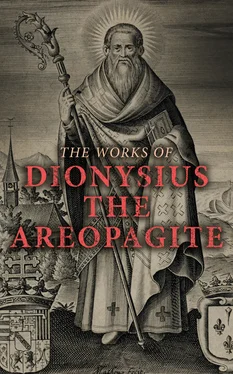SECTION II.
But if any one should say that we introduce in so doing a confusion, in disparagement of the distinction which befits God, we do not think that such a statement as this is itself sufficient to convince that it is true. For, if there is any one who has placed himself entirely in opposition to the Oracles, he will be also entirely apart from our. philosophy; and, if he has no care for the divine Wisdom of the Oracles, how shall we care for his guidance to the theological science? But, if he regards the truth of the Oracles, we also, using this canon and illumination, will advance unwaveringly to the answer, as best we can, by affirming that theology transmits some things as common, but others as distinctive; and neither is it meet to divide the common, nor to confuse the distinctive; but that following It according to our ability, we ought to rise to the Divine splendours; for, by taking thence the Divine revelations, as a most excellent canon of truth, we strive to guard the things lying there, in their native simplicity and integrity and identity—being ourselves guarded in our guard of the Oracles, and from these receiving strength to guard those who guard them.
SECTION III.
The (Names) then, common to the whole Deity, as we have demonstrated from the Oracles, by many instances in the Theological Outlines, are the Super-Good, the Super-God, the Super-essential, the Super-Living, the Super-Wise, and whatever else belongs to the superlative abstraction; with which also, all those denoting Cause, the Good, the Beautiful, the Being, the Life-producing, the Wise, and whatever Names are given to the Cause of all Good, from His goodly gifts. But the distinctive Names are the superessential name and property of Father, and Son and Spirit, since no interchange or community in these is in any way introduced. But there is a further distinction, viz., the complete and unaltered existence of Jesus amongst us, and all the mysteries of love towards man actually existing within it.
SECTION IV.
But it is rather necessary, I suppose, to resume and to set forth the complete fashion of the Divine union and distinction, in order that the whole discourse may be seen at a glance to reject everything ambiguous and indistinct, and to define critically and distinctly the proper Names, as far as possible. For, as I said elsewhere, the sacred instructors of our theological tradition call the “Divine Unions” the hidden and unrevealed sublimities of the super-unutterable and super-unknown Isolation; but the “distinctions,” the goodly progressions and manifestations of the Godhead; and, following the sacred Oracles, they mention also properties of the aforesaid “Union; “and again of the distinction, that there are certain specific unions and distinctions. For example, with regard to the Divine Union, that is, the Superessentiality, there is kindred and common to the One-springing Triad, the superessential sustaining Source, the super-Divine Deity, the super-good Goodness, the supreme identity of the whole supreme Idiosyncrasy, the Oneness above source of one; the Unspeakable; the Much-speaking, the Agnosia, the Comprehended by all, the Placing of all, the Abstraction of all, that which is above all affirmation and abstraction, the abiding and steadfastness in each other, if I may so speak, wholly super-united and in no part commingled of the One-springing Persons, just as lights of lamps (to use sensible illustrations familiar to our capacity), when in one house, are both wholly distinct in each other throughout, and keep the distinction from each other specifically and perfectly maintained, being one in distinction and distinct in union; and then, indeed, we may see in a house, in which are many lamps, the lights of all united to form one certain light and lighting up one combined radiance; and, as I suppose, no one would be able to distinguish in the air containing all the lights the light of one or other lamp from the rest, and to see one without the other, since whole in whole are mixed together without being mingled. But, if any one were to take out from the chamber one particular burner, the whole light belonging to it will depart with it; no particle of the other lights being drawn along with it, nor any of its own light left with the other. For there was, as I said, the complete union of all with all, unmingled throughout, and in no part confused, and this actually in a body, the air, the light even itself being dependent on the material fire. Whence we affirm that the superessential Union is fixed above not only the unions in bodies, but also above those in souls themselves, and in minds themselves, which, in a manner unmingled and supermundane, the Godlike and supercelestial Illuminations, whole through whole, possess, as beseems a participation analogous to those who participate in the Union elevated above all.
SECTION V.
But there is a distinction in the superessential nomenclature of God, not only that which I have mentioned, namely, that each of the One-springing Persons is fixed in the union itself, unmingled and unconfused; but also that the properties of the superessential Divine Production are not convertible in regard to one another. The Father is sole Fountain of the superessential Deity, since the Father is not Son, nor the Son, Father; since the hymns reverently guard their own characteristics for each of the supremely Divine Persons. These then are the unions and distinctions within the unutterable Union and sustaining Source. But, if the goodly progression of the Divine Union, multiplying itself super-uniquely through Goodness, and taking to itself many forms, is also a Divine distinction, yet, common within the Divine distinction, are the resistless distributions, the substance-giving, the life-giving, the wise-making, and the other gifts of the Goodness, Cause of all, after which from the participations and those participating are celebrated the things imparticipatively participated. And this is kindred and common, and one, to the whole Divinity, that it is all entire, participated by each of the Participants, and by none partially. Just as a point in a circle’s centre participates in all the circumjacent 27straight lines in the circle, and as many impressions of a seal participate in the archetypal seal, and in each of the impressions the seal is whole and the same, and in none partial in any respect. But superior to these is the impartibility of the Deity—Cause of all—from the fact that there is no contact with it. Nor has it any commingled communion with the things participating.
SECTION VI.
And yet some one might say the seal is not whole and the same in the images throughout. But of this the seal is not the cause, for it imparts itself all and the same to each; but the difference of the recipients makes the figures dissimilar, since the archetype is one and complete and the same. For instance, if the wax were soft and impressionable, and smooth and unstamped, and neither unimpressionable and hard, nor running and dissolving, it will have the figure clear and sharp and fixed. But if it should lack any of the aforesaid aptitudes, this will be the cause of the non-participative and un-figured and indistinct, and whatever else arises from inaptitude for reception. Further, there is a distinction from the goodly work of God towards us, in that the superessential Word was invested with being amongst us—from us—wholly and truly, and did and suffered whatever things are choice and pre-eminent in His human work of God. For in these, the Father and the Spirit in no respect communicated, except perhaps, one might say, as regards the benign and philanthropic purpose, and as regards all the pre-eminent and unutterable work of God which the unchangeable, qua God and Word of God, did when He had been born amongst us. Thus we, too, strive to unite and distinguish in the Word the things Divine, as the things Divine themselves, are united and distinguished.
Читать дальше












